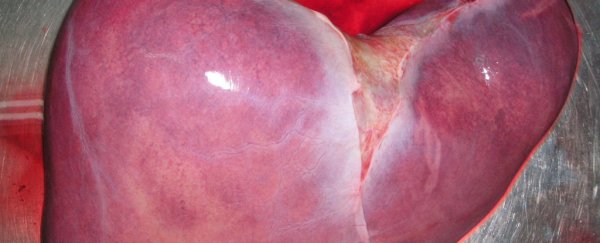Our liver is a pretty resourceful organ - it detoxifies our blood, helps regulate our metabolism, and if up to two-thirds of it is removed, it can regenerate.
But new research suggests livers are even more unique than we expected. While mice are awake, their livers grow by almost 50 percent, before shrinking back to their original size while they sleep. This cycle happens day in and day out, and it's the only organ researchers know of that oscillates this way.
Previous ultrasound studies of the liver have suggested that the same size fluctuation happens in humans. But this is the first time scientists have been able to identify the cellular mechanism that drives this process, and link it to daily circadian rhythms.
If the same process is verified in humans, it means that not only are our livers even weirder than we ever imagined, but it also suggests that our terrible sleeping patterns could be having a serious impact on our liver functions.
The experiment was conducted in mice, which have a 24-hour circadian rhythm much like we do, except they're nocturnal - they forage and run around while it's dark, and, during sunlight hours, they sleep.
The team showed that, overnight, while the mice were active and fed, the liver reached maximum efficiency and increased in size by almost half before shrinking back to its initial dimensions while the mice slept during the day.
"In rodents following a usual circadian rhythm, we observed that the liver gradually increases during the active phase to reach a peak of more than 40 percent at the end of the night, and that it returns to its initial size during the day," said lead researcher Flore Sinturel from the University of Geneva.
This was not only due to the liver cells themselves expanding, but also their protein content increasing during the mice's waking hours.
The number of ribosomes in each cell - the organelles responsible for producing protein - also fluctuated according to the mice's daily rhythm.
But it wasn't just the exposure to light controlling liver size - the team found that when the mice had their normal biological rhythm reversed and were forced to eat and stay awake during the day instead of at night, this growing and shrinking pattern didn't happen. Even if they were eating the same amount.
"The size of the liver and the hepatocytes, as well as their contents in ribosomes and proteins, remain nearly stable when mice are fed during the day," said one of the researchers, Frédéric Gachon, from the Nestlé Institute of Health Sciences in Switzerland.
"Yet, these animals ingest similar amounts of food, irrespective of whether they are fed during the night or during the day."
This is the first time researchers have discovered how the liver fluctuates in response to the circadian rhythm and periods of feeding and fasting - and as far as scientists are aware, it's the only organ that oscillates in this manner.
Figuring out exactly how the liver works is important, because the organ plays a crucial role in metabolism and the elimination of toxins - something a lot of us need a hand with these days thanks to our high sugar, high fat, high alcohol diets, and sluggish metabolisms.
But considering many of us now eat following our busy work and social schedules as opposed to following day/night patterns, the research suggests our lifestyles could be impacting liver performance.
The next step is to test out whether the same thing is happening in humans, and whether it's governed by the same biological mechanism.
For now, we're just going to try to wrap our heads around the fact that our livers might be growing inside us throughout the day.
The research has been published in the journal Cell.
